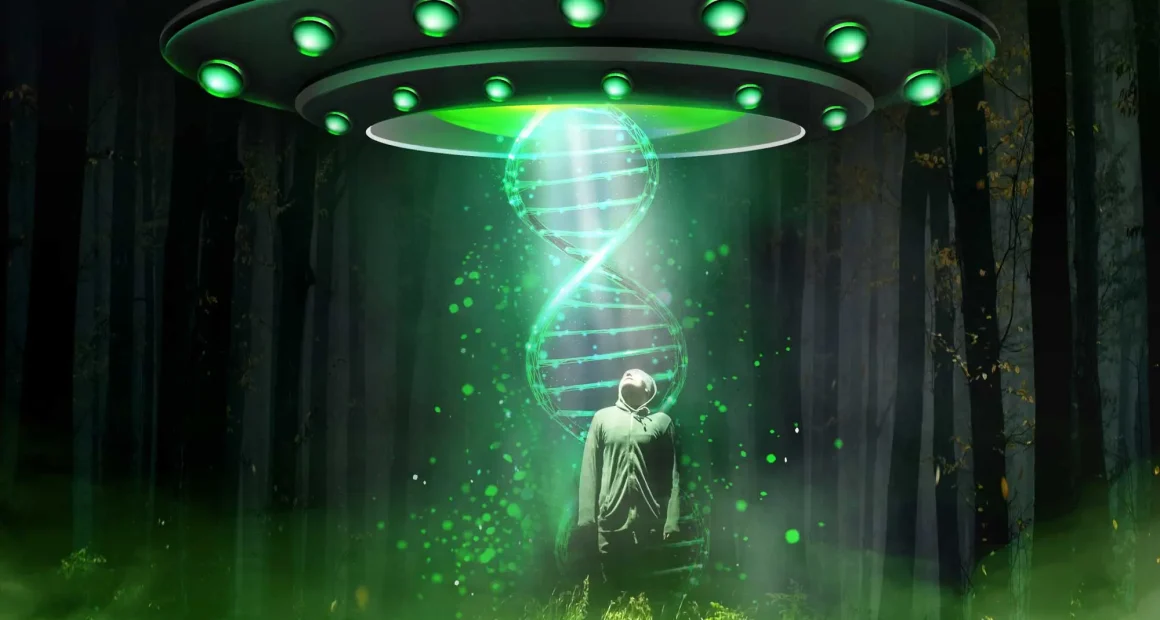Is This the Invasion of the Genome Snatchers?
Just when the thought of aliens in human skin suits wasn’t unsettling enough, a provocative new study claims extraterrestrials may have tampered with our DNA—potentially altering the genes of millions.
“Humanity may be undergoing genetic transformation,” said Dr. Max Rempel, founder and CEO of the DNA Resonance Research Foundation, in an interview with the Daily Mail. The study, which has not yet been peer-reviewed, makes a startling case for alien influence on human genetics.
“If proven, this would be as world-shattering as recovering a flying saucer,” said Nigel Watson, author of Portraits of Alien Encounters Revisited.
Dr. Max Rempel reached this seemingly far-fetched conclusion after analyzing DNA from both ordinary individuals and people who claim to have been abducted by aliens—a study that comes amid a recent spike in UFO sightings, fueling fears of potentially unwelcome close encounters.
Specifically, Rempel examined 581 complete families from the 1,000 Genomes Project and found “large sequences” of DNA in 11 families that did not match either parent. These anomalies included 348 non-parental genetic variants. Since all subjects were born before 1990, human gene-editing technologies like CRISPR—which only emerged in 2013—could not account for these findings.
Rempel also studied 23andMe results from self-identified alien abductees, uncovering evidence of non-parental markers in some families.
Alien DNA tampering could even have bestowed people with telepathic abilities, according to the study’s author.
If confirmed, he believes it may be possible to identify which humans carry alien DNA—essentially pinpointing “hybrids.” In other words, echoing the plots of Invasion of the Body Snatchers and They Live, his theory suggests that aliens are already among us, hidden within our genes.
The researcher also speculated—while stressing it is only a hypothesis—that a significant proportion of individuals with autism, ADHD, Asperger’s, and other neurodivergent traits might harbor these alleged alien insertions. Such modifications, he proposed, could even grant unusual abilities such as telepathy, similar to Ellen Ripley’s psychic powers in Alien Resurrection.
Yet even the scientist behind the claims acknowledges the caveats. Dr. Max Rempel, who earned a PhD from the Institute of Gene Biology in Moscow, concedes there is “no conclusive evidence yet,” explaining that “better datasets, which are available only on approval,” are needed to substantiate his theory.
“That takes time and effort,” he said, noting that existing commercial genotyping services—typically array-based—are not precise enough for such radical assertions. Rempel instead calls for next-generation sequencing (NGS) or whole-genome sequencing (WGS), which can detect novel variants with much higher resolution. His goal is to apply these techniques to parents and children who identify as alien abductees, in hopes of pinpointing where extraterrestrial DNA might have infiltrated the human genome.
Still, the hypothesis places Rempel in the same territory as some of the most fringe alien-hybrid theories—such as the controversial “Nazca mummies,” which were claimed to contain both human and alien DNA.
Nigel Watson, author of Portraits of Alien Encounters Revisited, urged caution, citing the small sample size and the challenges of relying on anecdotal claims of alien abductions.
If the evidence is confirmed, the researcher believes it “could be possible to detect which humans carry alien DNA, essentially identifying hybrids.”
At the same time, he cautions that “alien abduction experiences can stem from a variety of terrestrial factors. We need to carefully verify these accounts before drawing conclusions about DNA.”
Nigel Watson agrees that further genetic research on volunteer abductees is necessary, suggesting that any confirmed findings could be as “world-shattering as recovering a flying saucer.”
In the meantime, Rempel speculates that potential “alien hybridization” could have major implications for humanity’s future. “We need to consider how much alien hybridization is healthy for the planet, and which alien races we might give priority,” he said.








